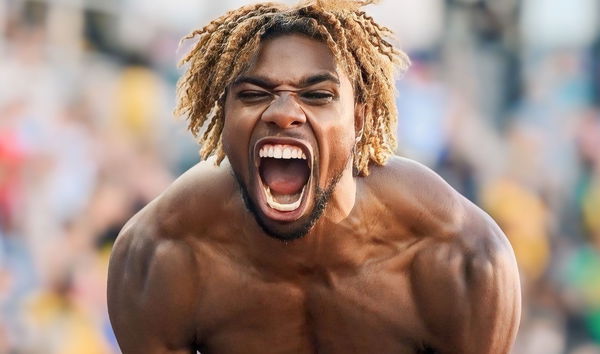

Noah Lyles isn’t one to mince words or shy away from speaking his mind, especially when it comes to issues within the track and field world. Earlier this year, he didn’t hold back when sharing his thoughts on the latest Nike Track kits for Team USA’s Paris Olympics 2024 campaign. The design didn’t exactly thrill fans and athletes, with some pointing out similarities to Great Britain’s jersey and others noting design flaws.
While Lyles hasn’t explicitly shared his opinion on the new kit, it’s pretty clear it’s not his favorite. When asked which USA Olympic uniform he preferred, he didn’t hesitate to mention his top picks: the 2004 and 2012 editions. “2004 and 2012,” he replied, making his preference known. But it’s not just fashion choices Lyles is vocal about. He’s also been critical of Nike and USA Track & Field’s collaboration, which has been making waves with its $500 million deal.
In a recent post on X, Olympic medalist turned digital creator Rori Dunk shared some revealing information: “Nike High School Nationals will also double as the USATF U20 Champs this weekend.” But what caught everyone’s attention in the thread was when Rori implied that athletes who skip this event could potentially miss out on the chance to represent the USA. In response to this development, Lyles didn’t hesitate to voice his criticism.
ADVERTISEMENT
Article continues below this ad
I hate this so much. From the understanding that I have on this situation I feel this is another way of US Track and Field shooting itself in the foot
— Noah Lyles, OLY (@LylesNoah) June 11, 2024
He took to social media, commenting below Rori Dunk’s post and expressing his frustration: “I hate this so much. From the understanding that I have on this situation, I feel this is another way of US Track and Field shooting itself in the foot.” As we reflect on these words by Noah Lyles, let us see how Fitzroy Dunkley explained how Nike’s $500 million sponsorship of USATF has influenced its decisions.
How did Nike’s $500 million influence USATF decision-making?
In his X thread, Rori Dunk shared that Nike has a massive financial influence on USATF through a substantial sponsorship deal, reportedly worth around $500 million. This sponsorship extends through 2040 and includes exclusive apparel rights for major events like the World Championships and the Olympics. However, the deal was under scrutiny, with concerns raised about its fairness and transparency in 2021.
Fitzroy Dunkley pointed out that the recent announcement that the Nike High School Nationals will also serve as the USATF U20 Champs implies a significant consolidation of events. He also shared that this move suggests that athletes who don’t participate in these events might face difficulties in making the U.S. team. He highlighted that the integration of these events, influenced by Nike’s sponsorship, raises questions about fairness and access for all athletes.

Further, Rori Dunk highlighted the competition for high school athletes’ endorsements, especially with the expansion of Name, Image, and Likeness (NIL) agreements. By partnering with USATF, Nike seems to be leveraging its influence to attract top talent to its events, potentially to the detriment of other competitions and athletes sponsored by rival brands.
Despite the concerns raised, Rori Dunk expressed hope that there might be some mechanism for athletes from other meets to qualify based on ranking, although this sentiment is somewhat skeptical given the apparent dominance of Nike-sponsored events. As we reflect on these concerns, let us see how this is not the first time the USTAF has faced criticism.
Noah Lyles’ recent words point towards another decision by USTAF this year that sparked controversy in track and field
On April 8, 2024, on its official website, the USATF released an official statement saying, “It has been decided that USA Track & Field will not be sending a Team to the 2024 World Athletics Under-20 Championships in Peru.“ The decision was based on several factors, including safety concerns, timing conflicts, and the lack of adequate competitive opportunities for athletes. This decision sparked significant controversy within the track and field community.
ADVERTISEMENT
Article continues below this ad

ADVERTISEMENT
Article continues below this ad
On the “Ready Set Go” podcast, Olympic champion Justin Gatlin expressed his frustration over the cancellation of the Lima championships, stating that it robbed a generation of athletes of valuable experience. He emphasized the importance of international competition for young athletes’ development and readiness for elite-level events.
Furthermore, even track and field veteran Michael Johnson questioned the decision, asking in a post on X at the time, “Is the track & field global champs model in trouble?” The new controversy highlighted by Rori Dunk, along with Noah Lyles sharing his perspective, has introduced a fresh dimension to USATF’s decision-making process. What are your thoughts on this development? Feel free to share in the comments below!
ADVERTISEMENT
ADVERTISEMENT
ADVERTISEMENT
ADVERTISEMENT

